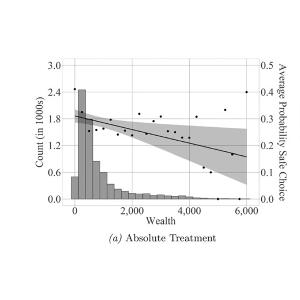
Our Research
Our research focuses on decision-making under risk and uncertainty with specific attention on behavioral theories. We consider both general questions of decision theory and applied questions in various fields.
Skip to content
Our research can braodly be classified into the following categories:
- Decisions under Risk and Uncertainty
- Insurance Demand and Insurance Markets
- Operational and Financial Risk Management
DFG Project
Intertemporal Aspects of Risk Management and their Behavioral Implications
Risk management is generally understood as a tool for hedging variability across different states of the world. However, most risk management decisions also include a temporal component, which is rarely considered in research. The DFG-funded research project “Intertemporal Aspects of Risk Management and their Behavioral Implications”, investigates the temporal component of risk management in general and of insurance decisions in particular. For this purpose, we first analyze whether decision makers recognize the temporal component of risk management and integrate it into their decisions. In a second step, well-documented intertemporal behavioral patterns are applied to risk management decisions and their effects are explored. Specifically, we examine whether people's preference to resolve uncertainty about losses early increases their willingness to pay for risk management. Furthermore, we consider whether the commitment to future payments resulting from insurance contracts affects insurance demand. Such a commitment could increase insurance demand if people are aware that they disproportionately weight current consumption much more than future consumption. Under these circumstances, people know that their saving behavior will not be sufficient to build up their own collateral and therefore have a willingness to pay for extrinsically enforced commitment to future payments.
The goal of the project is to better understand the temporal component of risk management. Based on this understanding, general insights into intertemporal decision behavior under risk can be derived. In addition, the findings of the project result in recommendations for action for policy makers and the private sector. One example are guidelines regarding the optimal design of insurance contracts from a behavioral science perspective.

DVfVW Project
Insurance Demand in Incomplete Insurance Markets – Theoretical Considerations and Experimental Evidence
Not all risks can be insured. While households can insure against a range of risks, there will always be residual risks that they must bear themselves. Although theoretical considerations show that uninsurable risks can have a strong influence on the demand for insurance for insurable risks, conventional insurance demand models ignore these risks. This is because there is currently no empirical evidence of an actual impact. The project proposed here aims to close this gap. To this end, the theoretical predictions will be tested using a behavioral science experiment. Potential results will not only inform insurance demand theory, but are also particularly relevant for insurance practice. Companies can use the results to identify areas where insurance coverage is particularly important for customers and thus close potential gaps in their offerings. Theoretical considerations developed in the project based on behavioral science decision models will improve the accuracy of demand forecasts.

Finance & Risk Seminar
The Finance & Risk Seminar aims to facilitate the scientific interaction between professors, postdocs and Ph.D. students of the Ludwig-Maximilians-Universität and national and international visiting scholars about current research questions on finance and risk management. The seminar is organized jointly by all chairs and professorships in the Finance and Insurance Cluster at the LMU Munich School of Management. Please visit our event page with all relevant information on the seminar of the current semester.
The schedules from previous semesters can be downloaded below:

